Book Rec: Fiendish
Clementine DeVore spent ten years trapped in a cellar, pinned down by willow roots, silenced and forgotten.
Now she’s out and determined to uncover who put her in that cellar and why.
When Clementine was a child, dangerous and inexplicable things started happening in New South Bend. The townsfolk blamed the fiendish people out in the Willows and burned their homes to the ground. But magic kept Clementine alive, walled up in the cellar for ten years, until a boy named Fisher sets her free. Back in the world, Clementine sets out to discover what happened all those years ago. But the truth gets muddled in her dangerous attraction to Fisher, the politics of New South Bend, and the Hollow, a fickle and terrifying place that seems increasingly temperamental ever since Clementine reemerged.
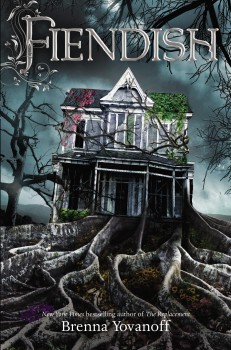
Fiendish is the first book by Brenna Yovanoff that I’ve read—and it definitely won’t be the last. In fact, I’m currently devouring Paper Heart and liking it possibly even more than Fiendish. But first: Fiendish.
This book has atmosphere. Gloomy, strange, beautiful atmosphere. It evokes the country town of New South Bend so well that I could see it, smell it, hear it. And it’s perfect for the rich, close magic of the books inhabitants: the bizarre and sometimes terrifying fiends and the humans related to them.
One of the other things that I liked best is that closeness. This isn’t a book about saving the whole world, but just about saving a small town. The story takes place over just a few days, following Clementine and her cousin and friends, and it feels very intimate. A lot that is the great characterization—Yovanoff is a master at giving us small details about the characters that really make them pop.
But I also like that it is a story itself is set on a smaller scale than a lot YA. Especially because that doesn’t mean the book is less awesome or less meaningful than books where an entire civilization or a country or particular population is at stake. The stakes here may be smaller, but they are not small. And that’s something that I think that goes missing from a lot of YA on a publishing level. I mean, I love a huge change-the-world story as much as anyone, but sometimes I think that publishers pigeon hole all YA books with this idea. The idea that the stakes have to be all-encompassing, life or death, every moment heightened and intense. Those stories can be fantastic, but there’s room for other stories—and they can have just as all-encompassing an effect on the reader. Fiendish is a great example of a book like this, and one that I hope will bring some light to other books like it.
Thoughts on Fan Fiction and Liking What You Like
The other day I was invited to talk to a class at a local university. It was all female, composed mainly of English and Language majors, with a good percentage of writers among them. We talked about publishing and writing, about finding internships in writing-related fields, about books and reading. About halfway through the class, a girl who had asked several writing-specific questions raised her hand.
“I have to ask an embarrassing question now,” she said. “I may regret it for the rest of my life, but I have to ask.” She had obviously been working herself up to ask this question and was still really nervous about it. She took a deep breath.
“How do you feel about fan fiction?”
I knew what she was half-expecting me to say something along the lines of: “Fan fiction’s not real writing.” “Fan fiction is just plagiarism.” “Fan fiction is a waste of time.” She was braced for it, eyeing me with this trepidatious look that said she’d either had people say these kinds of things to her or had read them online a lot.
I could literally see her sigh with relief when I said, “I think fan fiction is great. It’s a really fun way for people to interact with stories and characters that they love, and that’s why we read, right? Because we love stories and characters and want to hang out in those worlds.” A friend sitting next to her put a hand on her shoulder and whispered something along the lines of “See? I told you!” I went on to say that I would really feel like I had “made it” as an author if I saw some fanfic of my books online, and soapboxed a little about how much of fan fiction is written and read by women and how society tends to look down on things primarily enjoyed by ladies. I could see her sitting up straighter as I talked, as someone in a position of authority validated something she loved. (Not saying that I actually have more authority to speak about this than anyone else, just that I think it was viewed that way since I was speaking to the class as an author as well as a reader.)
We moved on to other topics from there, but I’ve been thinking about that young woman and her question ever since. And so I’m going to soapbox a little more here. Not with anything revolutionary, not with anything that others haven’t said before and often better, but with something that I think we just need to be reminded of as readers and writers every now and then. And that’s this:
Don’t be ashamed of what you love.
It’s so commonplace for us these days. We talk about reading guilty pleasure books, which automatically says that we should feel guilty about what we’re reading. We downgrade the things that we write, saying it’s “only” fan fiction. We often do these things even before anyone has criticized us for them, automatically, because we’re so used to seeing them denigrated by our overall culture. We’re on the defensive about what we like, ready to say that something is “just a beach read” or that we’re only reading a YA book “because my kids are.”
I’ve done it myself. I still do it myself, though I’ve made a concerted effort over the last five years or so to stop doing it. It’s hard sometimes, because we’ve been trained to say that some books or movies are bad and some are good—or maybe just good for us. And it’s especially hard when we have the feeling that the person we’re talking to is going to mock us—internally or externally—for what we like.
But we should stop doing this. Stop censoring ourselves for what we like to read and write and stop putting other people down for what they read and write. Because we read for all kinds of reasons. Sometimes we read to expand our horizons, to push ourselves by delving into language that challenges us or characters who present us with situations we never considered. Sometimes we read strictly to be entertained, to escape the boring plane ride or to distract ourselves while someone we love is in surgery. Sometimes we read to hang out with characters we already know and love, to immerse ourselves in the company and comfort of literary best friends. Sometimes we write to create entirely new worlds and people, or to try to affect our readers in ways that they will carry with them forever. Sometimes we write for ourselves, because it’s fun or silly or we just freaking feel like it. And, a lot of the times, we read and write in more than one of these ways at once. Or we move back and forth between them as we feel like.
I’m not saying there aren’t poorly written books or problematic books. But I am saying that, as a society, we should spend less time wagging our fingers at people for reading or writing things that we think fall into these categories—because a lot of the time it’s not the books. It’s us. It’s our preconceived notions of what makes a good book or an important book or a worthy book. It’s the voice that says all romance novels are tripe, that YA books can’t possibly as complex as books written for adults, that comic books aren’t real reading.
But there are great romance novels, and there are YA books that are more complex than some adult books, and there are comic books that can be as affecting as any novel. And even if there were not, people should still be allowed to enjoy them because they enjoy them. It’s as simple as that.
The stories that we love are things we should embrace rather than hide, affirm rather than mock. We don’t have to read or write for just one reason, or in just one way.
Soapboxing concluded.
Book Rec: Kill Me Softly
A few years ago, I tried to get into the TV show Once Upon a Time. Some friends of mine really liked it, and it sounded right up my alley. Fairy tales? Check. Fractured fairy tales? Check. Awesome sparkly costumes? Check. Evil queens? Check. Heroines with unknown heritages? Check. So I sat down and watched a few episodes . . . and it just didn’t work for me.
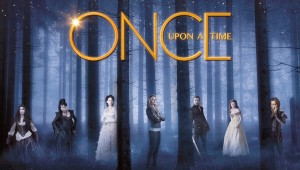
A lot of it was the dialogue, which felt stilted and cliched to me. Some of it was that I have a low tolerance for The Cute Kid in most of that role’s standard forms (though Orphan Black actually does a great job in having a Cute Kid that I find authentically cute and sympathetic). Part of it was that I felt like the intersection of fairy tales and real life wasn’t as well done as it might have been—I kept getting caught up on “wait, couldn’t they just do this?” and “why doesn’t x happen on a regular basis?” kinds of questions. Whatever it was, OUAT turned out to be a show that I wanted to like much more than I actually did, so I eventually abandoned it. But I felt frustrated, because I really liked the concept. I just kept hoping that someone would do it better.
And, happily for me, someone has. I recently finished Sarah Cross’s Kill Me Softly and the associated short story, “Twin Roses,” and they totally hit the spot that I was hoping OUAT would hit. Here’s the scoop:
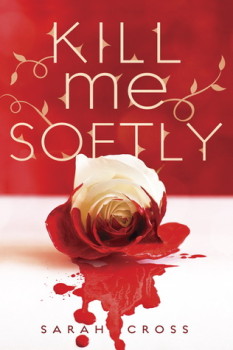
True love’s kiss just may prove deadly . . .
Mirabelle’s past is shrouded in secrecy, from her parents’ tragic deaths to her guardians’ half-truths about why she can’t return to her birthplace, Beau Rivage. Desperate to see the town, Mira runs away a week before her sixteenth birthday—and discovers a world she never could have imagined.
In Beau Rivage, nothing is what it seems—the strangely pale girl with a morbid interest in apples, the obnoxious playboy who’s a beast to everyone he meets, and the chivalrous guy who has a thing for damsels in distress. Here, fairy tales come to life, curses are awakened, and ancient stories are played out again and again.
But fairy tales aren’t pretty things, and they don’t always end in happily ever after. Mira has a role to play, a fairy-tale destiny to embrace or resist. As she struggles to take control of her fate, Mira is drawn into the lives of two brothers with fairy-tale curses of their own . . . brothers who share a dark secret. And she’ll find that love, just like fairy tales, can have sharp edges and hidden thorns.
I really, really enjoyed Kill Me Softly. Beau Rivage is populated (though not exclusively) by people cursed or blessed to play out roles in fairy tales: sleeping princesses, charming princes, beasts, evil stepmothers. Seeing the different permutations of various story roles fascinated me, from the singer who has to deal with coughing up jewels on a regular basis to the boy currently in the acting-like-an-ass stage before being transformed into a beast. And Sarah Cross does a great job of melding the curses/blessings into modern life—they never felt forced or awkward.
I also think she did a great job in terms of having a main character with specific fairy tale traits. Mira’s curse (which I won’t reveal for spoilers) leads her to have a lot of curiosity, sometimes pressing forward when she oughtn’t. She does some headstrong things, but she never crosses that line that makes me pull away in a “WTF are you doing, Main Character?” pique. She was believable as a girl trying to make her own path, yet also constrained by the terms of a fairy tale curse. The same goes for Blue, the main male character of the story. As an avid reader of fairy tales, I figured his curse out pretty much immediately, then enjoyed watching him pit himself against it. (Especially since it gives an actual reason for the initial-dislike-gives-way-to-affection trope!)
After finishing the book, I immediately downloaded “Twin Roses,” even though I had other books waiting in my queue. It follows two sisters cursed with the Snow White and Rose Red roles, is as fun and tasty as the cupcakes the girls sell at their bakery, and—extra bonus—deals with a question from the story that always bugged me as a kid. The related novel, Tear Me Apart, which follows one of the minor characters from Kill Me Softly, is out now, and I can’t wait to read it.
So: a big recommendation for lovers of fairy tales and OUAT, for readers who like a bad boy in their YA, and those who like a girl who figures her own way out of bad situations.
Upcoming Writing Workshop
Like many writers, I have a day job in addition to writing books. Happily, mine happens to have a lot of writing synergy: I’m the editor of Nimrod International Journal at The University of Tulsa. Nimrod publishes two issues of short fiction and poetry a year and has been around since 1956. (The journal, not me. I’ve only been with it since 1999. Which is still nearly a third of my life. Which is a little scary.) Aside from publishing the journal, we do several writing/reading related programs throughout the year. The biggest one is our Conference for Readers and Writers, and it’s coming up on October 25th.
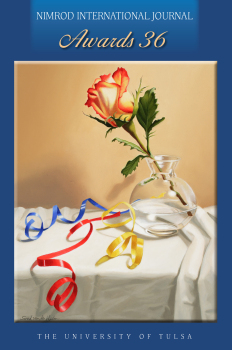
Fall/Winter 2014 issue
The Conference is a day-long writing workshop, and it’s really fun. Especially since we now bring in fantasy and science fiction authors in addition to our poets and literary fiction authors. (Basically, I go through my shelves each year and decide which author I love that I would like to meet. Being the boss has some perks.) I’ve had a fantastic time getting to meet and learn from authors such as Peter S. Beagle, Kelly Link, Patricia C. Wrede, Sharon Shinn, Rosemary Clement-Moore, and Gail Carriger. Seriously, getting to hang out with Peter Beagle was amazing. And I only teared up a little when he signed my copy of The Last Unicorn.
This year, I’m really excited because Malinda Lo will be joining us. I discovered Malinda through her first book, Ash, which is a retelling of Cinderella with a lesbian romance. It reminded me of Robin McKinley—a high bit of praise from me—and yet was also all its own. Her three books since (Huntress, Adaptation, and Inheritance) have also been awesome, and she writes some of the most interesting and thought-provoking blog posts in YA lit. She’s also the co-founder of Diversity in YA with author Cindy Pon, and if you don’t follow them on Tumblr and elsewhere, go do it now. I’m stoked to meet her, and I’m totally planning on sneaking into her class, which is going to be on the Five Foundations of Fantasy Worldbuilding, for as long as I can. (Which is sometimes not that long, because I’m the one who deals with All The Things at the conference. But still: EXCITED!!!!)
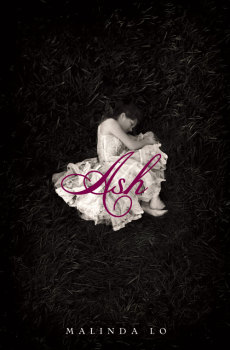
The conference is open to the public, so if you’re in the area of Tulsa, OK, you should attend. (And by “the area,” I mean any drivable distance. We have folks come in from several states, and they assure me the drive is worth it.) It’s a busy day, but a relaxed one, and a warm and welcoming environment. We have writers of all age levels and experience levels. I’m especially proud of this, because it makes it a good place for young writers who haven’t ventured out to conferences or conventions before to get their publishing world feet wet.
We start out the day with two panel discussions. I moderate one—a Q&A session where the audience gets to ask our panelists any questions they have about publishing or editing. This will be the third or fourth year I’ve moderated it (I was super nervous the first year, but I think I’ve hit my stride by now). Then we’ll have group classes about writing fiction, poetry, memoir, and performance of literature, in addition to YA fantasy. We’ll also have a class on paths to publication, including agents, small presses, and self-publishing. And you can submit your work and sign up to have a critique session with one of the editors of the journal. Plus readings and book signings and lunch and snacks and getting to hang out with awesome authors. I ask you: How can you go wrong?
The conference price is $50, but we also have scholarships available that lower the cost to $10. Anyone can apply for a scholarship, though we especially recommend them for students and teachers.
So that’s what I’ll be doing on October 25th. (And it’s why I’ve been kind of quiet on my social media the last month or so—organizing a conference like this is tiring!) I hope I’ll see you there!
This Week’s Reads
Some of the books that I have been most impressed with over the last few years are Laini Taylor’s Daughter of Smoke and Bone books. The last book, Dreams of Gods and Monsters, came out recently, though I was a little late in getting to read it, since I let my husband read our copy first. Given how much I was looking forward to the book, I think I deserve gold stars for this good deed. (And no, I will not revoke my gold stars just because I had about eight library books out at the time Dreams came out and I needed to read all of them and get them back to the library before incurring enormous fines. It was still selfless of me. Noble even. Totally gold star-worthy.)
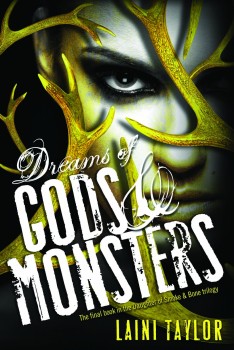
Dreams of Gods and Monsters
In any case, Dreams of Gods and Monsters is a fantastic end to a marvelous series. It’s always great when a writer takes the narrative in a direction that you never saw coming, but that feels completely organic and natural and right. I can’t talk about too much of the plot of the book without heavy spoilers, but it both opened doors I had not realized were there and tied up threads that I knew were there in unexpected and satisfying ways. The worldbuilding expanded into new places that I hope (really, seriously hope) will be explored in additional books, though if not, I’ll still feel like this was a good place to stop.
One of the things that I have admired the most about these books is the humor in them. There’s wonderful romance, fantastic worldbuilding, high stakes, and devastating consequences, but threaded through it all are lines and scenes that literally make me laugh out loud. Sometimes cackle out loud. Out loud enough that you can hear me at the other end of the house and I once startled Zuul. (Who is, granted, startleable.) Being the last book in the series, this book has a lot more heavy lifting to do than the others, and is more serious in tone. But the chapter “Eyebrow Master Class” was one of the most hysterical pieces of writing I have read recently. I want to marry Zuzana. Or at least worship at her platform heel-shod feet.
In short, I’ve been saying for several years that these are among the best YA coming out now and the last book clinches it. If you haven’t read them, go now. Purchase. Borrow. Read.

